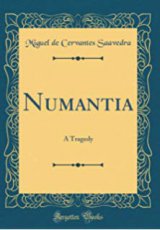The Siege of Numantia Page #7
The Siege of Numantia is a tragedy by Miguel de Cervantes set at the siege of Numantia. The play is divided into four acts. The dialogue is sometimes in tercets and sometimes in redondillas, but for the most part in octaves.
When, to thy heart's content, they have made war Against the Romans, and have curbed them well. Goths shall they be; who, bright with glory's star, Leaving their fame through all the world to swell, Will in thy bosom seek repose from strife, And give their sturdy powers a higher life. In coming years will Attila, that man Of wrath, avenge thy wrongs with bloody hands; Will place the hordes of Rome beneath the ban, And make them subject to his stern commands; And, forcing way into the Vatican,[6] Thy gallant sons, with sons of other lands, Will cause the Pilot of the sacred bark Take speedy flight, and steer into the dark. The time will also come, when one may stand And see the Spaniard brandishing his knife Above the Roman neck, and stay his hand At bidding of his chief, from taking life. The great Albano[7] he, who gives command To draw the Spanish army from the strife, In numbers weak, and yet in courage strong, A match in valour for a mightier throng. And when the rightful Lord of heaven and earth Is recognized as such on every hand, He, who shall then be stablished and set forth As God's viceregent over every land, Will on thy kings bestow a style of worth As fitting to their zeal as it is grand; They all shall bear of Catholic the name, In true succession to the Goths of fame. But he, whose hand of vigour best shall bind In one thine honour, and thy realm's content, And make the Spanish name, too long confined, Hold place supreme by general assent, A king shall be, whose sound and thoughtful mind On grand affairs is well and wisely bent; His name through all the world he rules shall run, The second Philip,[8] second yet to none. Beneath his fortunate imperial hand Three kingdoms once divided under stress Again beneath one single crown shall stand, For common welfare, and thy happiness. The Lusitanian banner, famed and grand, Which once was severed from the flowing dress Of fair Castile, will now be knit anew, And in its ancient place have honour due. What fear and envy, O beloved Spain, Shall bear to thee the nations strange and brave; Whose blood shall serve thy flashing sword to stain, O'er whom thy banners shall triumphant wave! Let hopes like these assuage the bitter pain, Which wrings thy heart in this sad hour and grave, For what the cruel Fates have willed must be, Numantia must abide the stern decree. SPAIN. Thy words, O famous Douro, have in part Relieved the poignant anguish of my wrong; There is no guile in thy prophetic heart, And so my confidence in thee is strong. DOURO. O Spain, thou mayst believe what I impart, Although these happy days may tarry long. My nymphs await me now, and so, farewell! SPAIN. May heaven thy limpid waters bless and swell! ACT II. SCENE I. Interlocutors. THEOGENES and CORABINO, with four other Numantines, Governors of Numantia, MARQUINO, a wizard, and a Corpse which will appear in due time. They are seated in council, and the four nameless Numantines are distinguished by First, Second, Third, and Fourth. THEOGENES. Ye valiant men, it seems to me this day That every adverse fate and direful sign Conspire to crush us with their baleful sway, And cause our force and fury to decline. The Romans shut us in, do what we may, With cruel craft our strength to undermine. No vengeance comes to us by death in fight, Nor, save with wings, can we escape by flight, Not these alone would crush us to the ground, Who oft have suffered at our hands defeat; For Spaniards too, with them in paction bound, Would cut our throats with treachery complete. May Heaven such knavish villany confound! May lightning flashes wound their nimble feet, Who rush to give their friends a deadly blow, And lend their succour to our wily foe! See if ye cannot now devise some plan To mend our fortunes, and our city save; For this laborious siege, of lengthened span, Prepares for us a sure and certain grave. Across that fearful ditch no single man May seek the fortune that awaits the brave; Though valiant arms, at times, in close array Will sweep a thousand obstacles away. CORABINO. I would that mighty Jove, in sovereign grace, Might grant our gallant youth this very day To meet the Roman army face to face, Where'er their arms might have the freest play. Not death itself, in such a happy case, Would keep their Spanish fortitude at bay; They'd hew a pathway, beat the foemen down, And succour bring to our Numantian town. But since we find ourselves in this sad state, Like women harboured and by force confined, Then let us do our utmost in the strait, And show a daring and determined mind; Let us invite our foes to test their fate By single combat; haply we shall find That, worn out by this siege and lengthened fray, They fain would end it in this simple way. But if this remedy should not succeed, And this our just demand should baffled be, One other plan may bring us better speed, Though more laborious, as it seems to me: That ditch and battled trench, which now impede Our passage to the foeman's camp ye see, By sudden night assault let us break through, And march for succour to good friends and true. First Numantine. Be it by ditch or death, we must, 'tis plain, Free passage force, if we would still survive; For death is most insufferable pain, If it should come when life is most alive. Death is the certain cure for woes that drain The strength of life, and on it grow and thrive; For death with honour is supremest bliss; No fate can be more excellent than this. Second Numantine. Can higher honour crown our latest years, If so our souls must from our bodies part, Than thus to rush upon the Roman spears, And dying, strike our foemen at the heart? Let him who will display the coward's fears, And stay within the city all apart; For me, at least, my life I'd rather yield, Within the ditch, or on the open field. Third Numantine. This cruel hunger, fearsome and malign, Which tracks our path, and goads us bitterly, Constrains me to consent to your design, However rash and hair-brained it may be. By death in fight this insult we decline; Who would not die of hunger come with me, To force the trenches, and with one accord Cut out a path to safety with the sword.
Translation
Translate and read this book in other languages:
Select another language:
- - Select -
- 简体中文 (Chinese - Simplified)
- 繁體中文 (Chinese - Traditional)
- Español (Spanish)
- Esperanto (Esperanto)
- 日本語 (Japanese)
- Português (Portuguese)
- Deutsch (German)
- العربية (Arabic)
- Français (French)
- Русский (Russian)
- ಕನ್ನಡ (Kannada)
- 한국어 (Korean)
- עברית (Hebrew)
- Gaeilge (Irish)
- Українська (Ukrainian)
- اردو (Urdu)
- Magyar (Hungarian)
- मानक हिन्दी (Hindi)
- Indonesia (Indonesian)
- Italiano (Italian)
- தமிழ் (Tamil)
- Türkçe (Turkish)
- తెలుగు (Telugu)
- ภาษาไทย (Thai)
- Tiếng Việt (Vietnamese)
- Čeština (Czech)
- Polski (Polish)
- Bahasa Indonesia (Indonesian)
- Românește (Romanian)
- Nederlands (Dutch)
- Ελληνικά (Greek)
- Latinum (Latin)
- Svenska (Swedish)
- Dansk (Danish)
- Suomi (Finnish)
- فارسی (Persian)
- ייִדיש (Yiddish)
- հայերեն (Armenian)
- Norsk (Norwegian)
- English (English)
Citation
Use the citation below to add this book to your bibliography:
Style:MLAChicagoAPA
"The Siege of Numantia Books." Literature.com. STANDS4 LLC, 2024. Web. 24 Nov. 2024. <https://www.literature.com/book/the_siege_of_numantia_60>.




Discuss this The Siege of Numantia book with the community:
Report Comment
We're doing our best to make sure our content is useful, accurate and safe.
If by any chance you spot an inappropriate comment while navigating through our website please use this form to let us know, and we'll take care of it shortly.
Attachment
You need to be logged in to favorite.
Log In